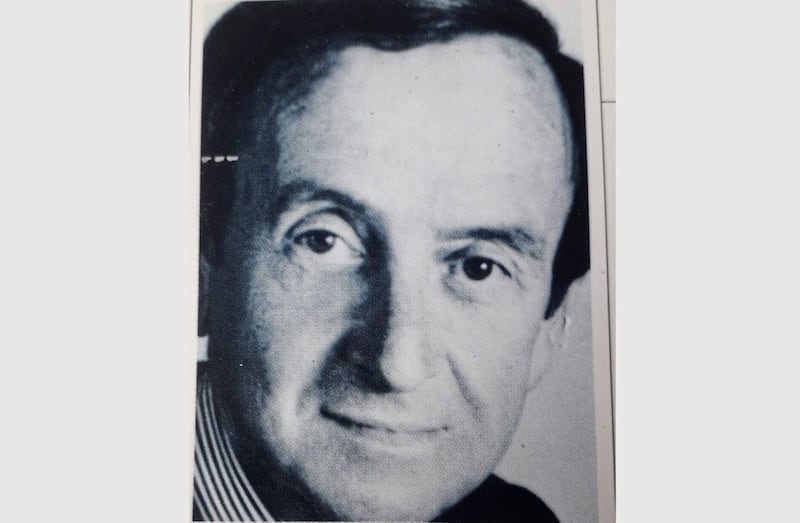The Dear Departed is, remarkably, a new book by Brian Moore. Moore was the most successful novelist to come from Belfast. He was shortlisted for the Booker Prize three times while many of his novels became internationally acclaimed movies (from The Lonely Passion of Judith Hearne, starring Maggie Smith, to Black Robe).
He died in 1999 and now his short stories are collected together for the first time to add to our understanding of Northern Ireland’s major novelist and the roots of his writing.
Moore became one of the most cosmopolitan of novelists – he wrote about France, Algeria and the Caribbean as much as Northern Ireland – and a glamorous figure, living in Malibu with “the Pacific at your door” as Seamus Heaney remembered. Yet, he began by writing about the Belfast of his childhood in novels that outlined his reasons for leaving the city.
He was born on August 25 1921 into a respected Catholic family. His father was senior surgeon at the Mater Hospital while his uncle was Eoin MacNeill, a founder of the Gaelic League who, in 1916 as president of the Irish Volunteer Force, had tried to call off the Easter Rising.
It was a nationalist family, interested in Irish culture (all his life Moore would clarify that his name used the Gaelic pronunciation, BREE-an) and deeply religious. His youthful rejection of that religion would define his relationship with his father and, like James Joyce before him, led to his decision to live in exile. Moore once wrote, “there are those who must flee Ireland to see Ireland plain”.
In an early short story Moore remembered his childhood: “The world was sweetie shops, Alexandra Park, the Antrim Road, Royal Avenue, Newington School, Miss Casey’s garden, and the big pond in the waterworks. All these things were part of Belfast and Belfast was in Ireland.”
A Vocation, the first story in The Dear Departed, describes two young boys discussing their school retreat and evokes the overpowering role Catholicism has over their young minds and the control the Church held over society during Moore’s childhood.
Although Moore rejected Catholicism at the age of 10, he wrote about it for the rest of his life (in novels as diverse as Catholics and the story of a Jesuit priest in 17th-century Canada, Black Robe).
Moore attended St Malachy’s College but failed his final exams, which destroyed his father’s hopes that he would go on to a medical degree at Queen’s University. In 1940, when he was 19, he joined Belfast’s Air Raid Precautions Unit. After his father died in 1942 he left Northern Ireland, joining the British Ministry of War Transport; he served in France, Italy and north Africa.
Near the end of the Second World War Moore visited Auschwitz as it was liberated and returned to Poland after the war with the United Nations Relief and Rehabilitation Administration. In 1948 he emigrated to Canada and rarely returned to Belfast afterwards.
However, Moore’s early novels, and many of his short stories, revolve around Belfast. His first, and most famous, novel is The Lonely Passion of Judith Hearne, which was published in 1955. It is one of the great northern Irish novels and portrays a lonely woman (loosely modelled on a friend of Moore’s family) who is isolated from the world and the people around her, surviving on delusions of intimacy with a family who dread her visits while suffering in genteel silence.

It is, even today, a striking account of frustration and desperation, of a city suffocating from sexual anxiety, where people are controlled by the need to be considered respectable. In 1955 it was swiftly banned for indecency in the Republic and Moore’s mother complained to him about its “sex parts”. Before sending a copy to one of the writer's sisters, who was a nun, Mrs Moore cut out any section that she considered sexually explicit.
While he was writing Judith Hearne, Moore produced several of the short stories collected in The Dear Departed. They share many of the themes and atmosphere of that novel, though they are more consciously influenced by Joyce and give an insight into Moore’s own feelings about his father and life as an emigrant.
In Grieve For The Dear Departed a mother mourns the death of her husband while looking forward to the return of her son, who left Ireland after an argument with his father over religion, for the funeral. In Uncle T another young man emigrates to Canada after another dispute with his father over religion and visits his uncle in New York, only to find that exile does not always lead to fulfilment: “Drink, that was an Irish weakness. Self-deceit, that was an Irish weakness.”
Moore’s short stories are as restless in their variety as his novels. Other stories from The Dear Departed display a humorous side to Moore. They include the supernatural tale of a Sicilian bandit who kidnaps a magician – it could be one of Roald Dahl’s Tales of the Unexpected – while the most joyous story allows Moore to take comic revenge on religion and express the freedom he found in Canada.
In Hearts and Flowers a group of homeless men are offered a Christmas lunch in return for singing hymns. Instead they march out on to the Montreal streets, singing ‘God Bless Ye Merry Gentlemen’, collecting enough money for “Beer, wine. Gallons of wine.”
The Dear Departed by Brian Moore, published by Turnpike Books (turnpikebooks.co.uk) is out now, priced £10 and available from bookstores and online








